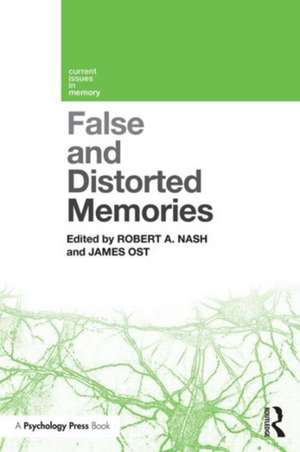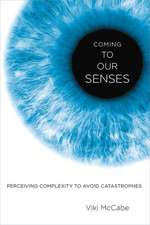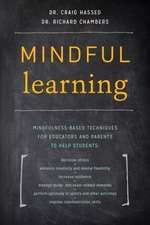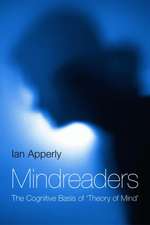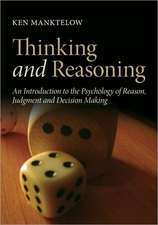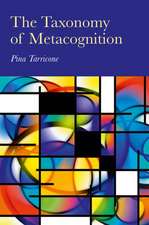False and Distorted Memories: Current Issues in Memory
Editat de Robert A. Nash, James Osten Limba Engleză Paperback – 19 oct 2016
False and Distorted Memories provides an overview of recent and ongoing developments in the science of false memory. World-leading researchers unpick questions about flawed recollections, discussing issues as varied as the reliability of highly emotional memories, why we sometimes begin to remember fictional experiences that we have deliberately fabricated, and what happens when we stop believing our memories. Each chapter demonstrates how memory science has furthered our understanding of these important questions, by exploring theoretical ideas and psychological research methods that underpin their investigations.
Edited by Robert Nash and James Ost, this volume offers an international and up-to-date perspective on false and distorted memories. The volume also draws attention to the broad range of real-life contexts in which such distortions might arise and their potential consequences. False and Distorted Memories illustrates the ease with which memory can be contaminated and the power of the resulting memory errors, providing an integral text for researchers and students interested in the psychology of memory.
| Toate formatele și edițiile | Preț | Express |
|---|---|---|
| Paperback (1) | 482.01 lei 6-8 săpt. | |
| Taylor & Francis – 19 oct 2016 | 482.01 lei 6-8 săpt. | |
| Hardback (1) | 818.67 lei 6-8 săpt. | |
| Taylor & Francis – 19 oct 2016 | 818.67 lei 6-8 săpt. |
Preț: 482.01 lei
Nou
Puncte Express: 723
Preț estimativ în valută:
92.23€ • 96.56$ • 76.32£
92.23€ • 96.56$ • 76.32£
Carte tipărită la comandă
Livrare economică 05-19 aprilie
Preluare comenzi: 021 569.72.76
Specificații
ISBN-13: 9781138832022
ISBN-10: 1138832022
Pagini: 176
Ilustrații: 4
Dimensiuni: 156 x 234 x 14 mm
Greutate: 0.28 kg
Ediția:1
Editura: Taylor & Francis
Colecția Psychology Press
Seria Current Issues in Memory
Locul publicării:Oxford, United Kingdom
ISBN-10: 1138832022
Pagini: 176
Ilustrații: 4
Dimensiuni: 156 x 234 x 14 mm
Greutate: 0.28 kg
Ediția:1
Editura: Taylor & Francis
Colecția Psychology Press
Seria Current Issues in Memory
Locul publicării:Oxford, United Kingdom
Public țintă
Postgraduate and UndergraduateNotă biografică
Robert A. Nash is a Senior Lecturer in Psychology at Aston University, UK.
James Ost is a Reader in Applied Cognitive Psychology at the University of Portsmouth, UK
James Ost is a Reader in Applied Cognitive Psychology at the University of Portsmouth, UK
Cuprins
1. Introduction- Robert Nash and James Ost 2. (Mis)remembering Negative Emotional Experiences- Jacinta Oulton and Melanie K. T. Takarangi 3. When Children are the Worst and Best Eyewitnesses- Henry Otgaar, Mark L. Howe, Nathalie Brackmann and Jianqin Wang 4. Photos and Memory- Kimberley A. Wade, Sophie J. Nightingale & Melissa F. Colloff 5. The Past is a Social Construction- Hartmut Blank, Eva Walther and Simon D. Isemann 6. Forced Fabrication and False Eyewitness Memories- Maria S. Zaragoza, Patrick Rich, Eric Rindal and Rachel DeFranco 7. Stories and Movies can Mislead- Elizabeth J. Marsh and Hillary G. Mullet 8. Cognitive Fluency and False Memories- Eryn J. Newman 9. Nonbelieved Memories- Alan Scoboria, Giuliana Mazzoni and Chantal Boucher 10. The Positive Side of Memory Illusions- Mark L. Howe, Emma Threadgold, Samantha Wilkinson, Sarah R. Garner and Linden J. Ball 11. False Memories Matter- Cara Laney and Elizabeth F. Loftus 12. Concluding Remarks- James Ost and Robert A. Nash
Descriere
Processes of remembering generally serve us well, but there are circumstances in which they can lead us to develop a distorted sense of our past. Research into the phenomenon of false memory has increased considerably over the last twenty years, focusing on the implications of distorted memories in legal and therapeutic contexts, and the perhaps less‐dramatic consequences for our sense of self and identity. False and Distorted Memories draws on the expertise of leading international researchers to present an up‐to-date snapshot of key developments in the field. It will also explore future directions, whilst synthesizing new findings on the causes, contexts and consequences of false memories.
